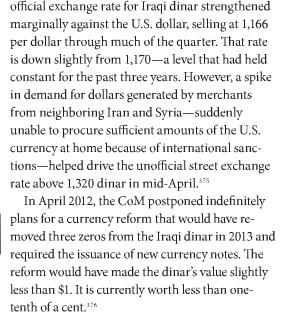
Fiscal reforms essential to rebuild Iraq and improve economic growth, IMF says
Recovering oil prices and improved security have helped Iraq strengthen its economy but it needs to implement reforms aimed at ensuring macroeconomic stability and mitigating risks from oil price volatility, according to the International Monetary Fund.
The near-term vulnerabilities in Iraq have eased with a large fiscal surplus in 2018 but post-war reconstruction and economic recovery has been slow while a fall in oil prices would pose a major risk to the outlook, the IMF said in a report on Friday.
Iraqi authorities should “seize the opportunity presented by the improved security situation and higher oil prices to implement policies and structural reforms aimed at ensuring macroeconomic and financial stability, tackling long-standing social problems and promoting sustainable and inclusive growth,” the IMF executive board concluded after a consultation with the Iraqi government.
Iraq faces “daunting” challenges after its war with ISIS: social conditions remain harsh following the conflict, with slow progress on rebuilding, weak public services and a lack of job opportunities, the IMF said. Given highly volatile oil prices, Iraq faces risk from a drop in crude prices, which would lower exports and revenues, leading to sharper declines in central bank reserves or higher public debt. In addition, geopolitical tensions and lack of progress in curbing corruption could pose further risk.
The Washington-based lender urged Iraqi authorities to adopt a fiscal policy that scales up public investment while gradually building buffers, as part of wider reforms to better manage oil revenues and protect from oil price shocks. To do this, the IMF recommended phased measures to lower current spending and boost non-oil revenue.
Tighter spending would mean containing public-sector wages and lowering subsidies to the electricity sector. A review of social spending must ensure that the country’s poorest are protected during these reforms, the fund said.
Iraqi President Barham Salih in February ratified the country’s $111.8 billion (Dh410.64bn) budget for 2019, its largest-ever with a 27 per cent increase over 2018. The bill calls for a rise in spending of $24bn and a deficit of $22.6bn during the year.
The IMF emphasised the need to strengthen public financial management to ensure government spending is monitored and to reduce vulnerabilities to corruption.
An overhaul of the banking sector is also needed to maintain financial stability, the IMF said. This can be done by restructuring state-owned banks and improving their supervision. Increasing access to funds, particularly for small-and-medium enterprises, can also help improve employment.
Building public institutions and enhancing governance is “key” for success, the fund added.
“Directors also recommended strengthening Public Investment Management framework to ensure that spending is well directed and that donor funds targeting reconstruction are put to the most efficient use,” according to the report.
To combat corruption, a “multi-pronged strategy” is required for strengthening the legal framework, developing national anti-corruption policies and fostering closer co-ordination between the involved agencies, the lender said.
“In the absence of policy changes, a widening budget deficit will divert resources away from essential investment to rebuild the country and improve public services, while eroding reserves and posing risks to medium-term sustainability,” the IMF said.
Thenational.ae
 THIS REPORT WAS SENT TO THE UNITED STATES CONGRESS. IT PLAINLY SHOWS IN THIS REPORT THEY EXPECTED THE DINAR TO REVALUE AT AROUND A DOLLAR IN 2013.
THIS REPORT WAS SENT TO THE UNITED STATES CONGRESS. IT PLAINLY SHOWS IN THIS REPORT THEY EXPECTED THE DINAR TO REVALUE AT AROUND A DOLLAR IN 2013.

 The legal expert Tariq Harb said that the third day of August begins the power of the speaker of parliament to remove the immunity from the deputy accused of his crime without the need to vote the parliament and continue this power for a month .
The legal expert Tariq Harb said that the third day of August begins the power of the speaker of parliament to remove the immunity from the deputy accused of his crime without the need to vote the parliament and continue this power for a month . The leader of the coalition of Iraqi decision Atheel Nujaifi, on Tuesday, to international intervention to reduce the phenomenon of corruption in Iraq, attributing to the involvement of regulators in this corruption.
The leader of the coalition of Iraqi decision Atheel Nujaifi, on Tuesday, to international intervention to reduce the phenomenon of corruption in Iraq, attributing to the involvement of regulators in this corruption. Nass – Baghdad: US Ambassador to Iraq Matthew Toler on Sunday commented on the US intention to include former Prime Minister Nuri al-Maliki on the list of possible future sanctions, while revealing the “justifications” of including the four previous figures.
Nass – Baghdad: US Ambassador to Iraq Matthew Toler on Sunday commented on the US intention to include former Prime Minister Nuri al-Maliki on the list of possible future sanctions, while revealing the “justifications” of including the four previous figures. The Oil Ministry has signed a cooperation agreement with its Kuwaiti counterpart and a British consulting firm in Jordan.
The Oil Ministry has signed a cooperation agreement with its Kuwaiti counterpart and a British consulting firm in Jordan. BAGHDAD: Iraq’s top judicial authority has requested the parliament lift immunity for 21 lawmakers, including 10 wanted on charges of corruption.
BAGHDAD: Iraq’s top judicial authority has requested the parliament lift immunity for 21 lawmakers, including 10 wanted on charges of corruption.


